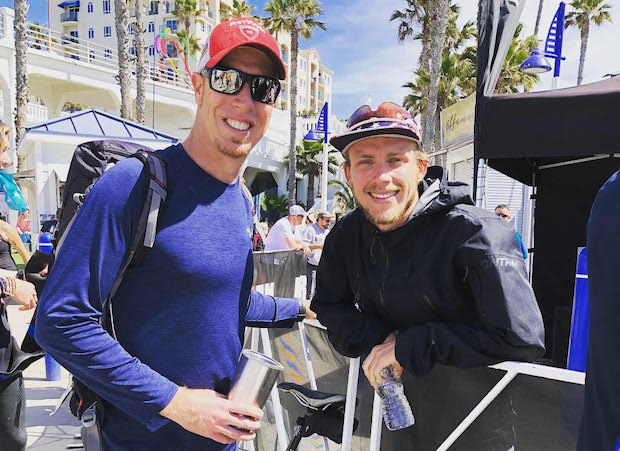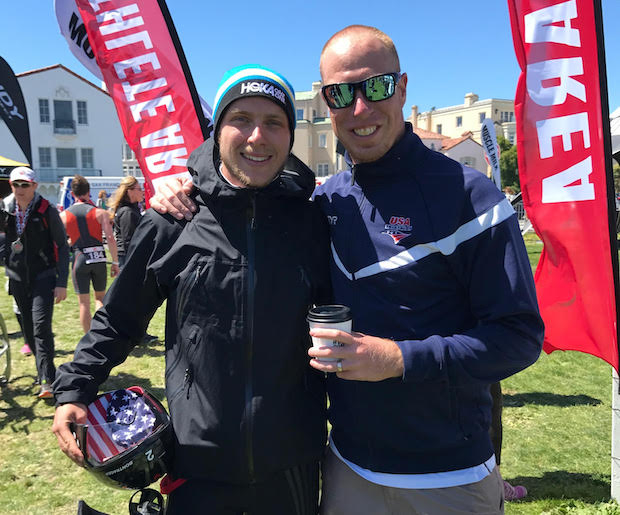Catching Up with Jim Vance

Coach Jim Vance is well-known locally as a regular contributor here on the Slowtwitch Forums. However, Vance is perhaps more well-known as the coach of Ben Kanute, who recently took second place at the IRONMAN 70.3 World Championships in St. George. Vance is also an author and consultant to many sports technology companies. He joined us to talk about the lead-in to Kanute's performance in St. George, as well as some lessons that might be applicable to the average athlete.
Slowtwitch: Jim, first, thanks for the time — and congratulations to you and Ben!
Jim Vance: Thank you, but all the congratulations should really go to Ben and the whole team. We have built an incredible team to support Ben, that includes Bobby McGee and Matt Pendola, Ben's family, and his sponsors, (Trek and Hoka especially, but Deboer and Santini as well). I'm just really happy for him. I have been blessed to play a small role in the journey, and that race was so much fun to watch.
ST: For some of our readers this might be the first time they've heard of you. Can you give us some details on your background and experiences?
Vance: I was a runner in college, ran track and cross country at the University of Nebraska. Walked-on there, had a full ride by the time I graduated, and was a part of some incredible successes, and amazing relationships there. It really set me on a path toward high performance coaching. I moved to San Diego in 2001, where I got introduced to triathlon. In 2004, my first season, I was XTERRA overall amateur World Champ. In 2005, I was ITU Age Group World Champ for M25-29, and then left my teaching job to pursue triathlon fully.
I was coached by Greg Welch, Peter Reid, and Joe Friel in my pro racing days, and reached a 3rd at Ironman Florida in 2006. I was exposed to a lot of new technology in the sport as an athlete at that time, and with my teaching, math and writing background, it became the foundation for me to launch my career as a coach. I wrote 3 books, (Triathlon Science with Joe Friel, Triathlon 2.0 and Run With Power), and even started a junior triathlon program in San Diego. I also do a lot of work for Today's Plan now, helping create new, innovative tools for coaches that help us coach more to our own IP and methodologies.
ST: When did you start working with Ben? How did that relationship develop?
Vance: I met Ben through my work with Adam Zucco, when he was coaching a big junior program out of Chicago — Multisport Madness — that had Ben, Kevin McDowell, Lukas Verzbicas, and a number of other top US juniors at the time. So I met Ben back when he was still just a youth elite, and was a resource for Adam during the journey for Ben. Post 2016 Olympics, Ben was looking to make a change, and Adam suggested he speak with me. Ben and I had some coffee in Kona in October 2016, and I laid out an approach and plan for him that showed a pathway to his goals, which were to win an Olympic medal in the Mixed Relay, and become a 70.3 World Champ. In 2017, the plan was showing to work even quicker than I expected. That really set the stage for us for the next 5 years.

ST: Let's talk about St. George a little bit. Both Kristian and Ben said it was encouraging seeing you on the run course at St. George on the way back into town. That a common place to find you come race day?
Vance: Hahaha, yeah, I tend to have a large presence. Anyone who watched the race can tell Ben feeds off the energy of the crowds. I am not at Ben's races very often, (family and work obligations), but when I come, I try to make it count.
ST: Kristian also mentioned that you may have accidentally inspired him.
Vance: Yeah, that's funny. I knew Ben was fighting and giving Kristian his best shot, and Kristian just wasn't cracking. I wanted to reframe Ben's mindset, and build his confidence up. Ben is the most decorated mixed relay athlete in US history, and I know if the race was a Mixed Relay, Ben would have no fear of Kristian. So, with 5K to go I said, "Just get it to a Mixed Relay distance," as a way to turn Ben back into the hunter in his mind. Kristian heard that, looked at me, looked at Ben, back at me, and I think he could sense that if he kept Ben close for a sprint, there could be some trouble for him. He heard me say, "Mixed Relay distance", and he said he knew that meant he had less than 20 mins to go, so he needed to push right then, down Diagonal. When he took off, he ran right at about 3 min/km pace for 1.1 miles, (4:50 mile pace), and Ben ran 5:02 pace for that same section, which is incredible.
You just have to tip your hat to Kristian. He took our best shot and still won.
ST: One thing that Ben has been open about are his struggles this year with illness, etc. As a coach, how do you handle illness, injury, fatigue, and how it leads into these world championship events?
Vance: The sickness this year was really challenging. Starting with the family getting COVID in January, and with his wife bedridden, he had to take care of their one year old, Briella. At one point I had to just tell him, "Ben, your family needs you right now, stop worrying about training."
Then there was another Covid battle a couple months later, then his wife in the hospital with the flu, (while pregnant), then a bad sinus infection thru Chattanooga and Alcatraz. By then, I was looking for explanations and solutions. At one point, he was still having solid training, but the races were so flat, it was incredibly frustrating for him. I had some theories that maybe it was a "long-covid" issue.
Probably a bigger role in all of that was the training approach we took. Ben felt with a departure from World Triathlon and draft-legal racing to a focus on 70.3 and PTO races, the approach should change. I acquiesced, and that probably drove him to the situations where he was susceptible to illness, and it hit him even harder. Post-Alcatraz, he went on antibiotics, got healthy, and we went back to the structure which had worked for the prior years. Suddenly he stayed free of sickness, and then the training started to stack up, and then about 2-3 weeks out from the race, we saw huge gains and knew he was back.
ST: Speaking of flexibility following illness or injury: with your athletes — do you find yourself needing to ever be a truth-teller (e.g., your expectations don't match what I'm seeing from workouts — either positively or negatively)? How do you approach those conversations?
Vance: I use data to show an athlete what the demands of competition are, so it's really just a question of are you showing you can meet those in training. Expectations need to be based on that standard first and foremost. This was the basis of the book, Triathlon 2.0, where I layout the demands of competition based on the athlete's age, gender and goals, with regard to 70.3 and full Ironman distance racing.
ST: What's the one thing an average age-group athlete might learn from Ben's experience in 2022?
Vance: Consistency of training, with an eye toward peaking for a single day on the calendar, is one of the hardest, but most critical aspects of performance. Once we got past the illnesses, Ben was methodical and consistent, and saw the results in training. Once he saw how fit he was, his confidence sky-rocketed. He came to the start line fit, healthy, and extremely confident and motivated. That is a dangerous mix for his competitors. That's what all athletes should be striving to achieve at the startline.
Instead, I see many athletes over-reaching in training, getting injured, struggling to stay consistent, training more based on peer-pressure than their needs, and then their attitude on the start line reflects the quality of their preparation. In 7 seasons of working with Ben, he has missed 0 starts for races. That's really incredible when you think about it. Even when training hasn't been perfect, we haven't been our own worst enemy, we've gotten to the start line and given him a chance.
And of course, the fact that Ben had the 3rd best run split, (17 secs off Blummenfelt's top split), shows that all athletes can greatly improve their run, if they make it a real priority. Nobody predicted Kanute on the podium, and even less people had him running as well as he did.
Thanks for the opportunity to do this interview, and now we will see how Ben does at Ironman Arizona!


Start the discussion at slowtwitch.northend.network